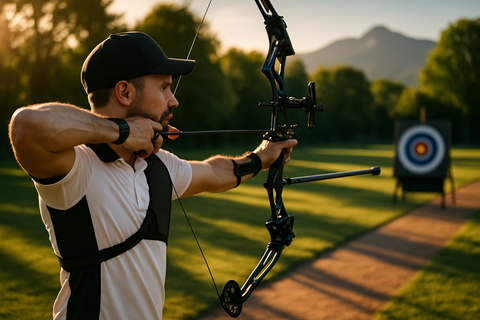
Sharpened Focus: How Low-Dose Nicotine Enhanced Archery Performance
Research Review: Nicotine supplementation enhances simulated game performance of archery athletes
Key Findings from the Study:
- Sharper Reaction: Nicotine cut “correct rejection” time by about 0.94 ms (from 8.23 ms down to 7.29 ms).
- Better Dexterity: Fine‐motor speed improved by 4.65 seconds on the pegboard test (from 53.41 s down to 48.76 s).
- Calmer Baseline, Fired‐Up Under Pressure: Resting saliva α-amylase dropped after nicotine, then jumped up immediately post-shooting—signaling a ready “sympathetic” surge when it mattered.
- More Bull’s-Eyes: Average archery scores rose 7.5 points (2.6%), from 290.6 to 298.1 out of 360.
In precision sports like archery, every millisecond and micro-movement counts. From steady aim to split-second release, cognitive clarity and finely tuned motor control can spell the difference between a bull’s-eye and a miss.
While traditional ergogenic aids focus on strength or endurance, recent research turns the spotlight toward an unconventional contender: low-dose nicotine.
Study Methodology
This study used a randomized, double-blind, placebo-controlled crossover design to examine whether a small dose of nicotine affects cognitive function, stress, and performance in skilled archers (1).
Participants included 11 elite archers (6 males, 5 females; non-smokers). Each participant completed two sessions spaced at least one week apart:
-
In one session, they received a 2 mg dose of nicotine.
-
In the other, they received a placebo dose that looked and tasted the same but contained no nicotine.
The order of the doses was randomized, and neither the participants nor the researchers knew which dose was given in each session.
During each session, participants:
-
Shot 36 arrows at an 18-meter target (standard indoor distance).
-
Completed two neurocognitive assessments:
-
A reaction time test is used to evaluate sustained attention through “correction rejections” or instances where a participant correctly withholds a response when they are not supposed to respond. Higher correction rejection scores indicate better attentional control—the participant was more focused and didn’t make unnecessary or impulsive responses. Think: holding back swinging the bat on a curveball.
-
A grooved pegboard test (GPT) to assess fine motor coordination.
To monitor physiological stress, salivary alpha-amylase (sAA) levels were collected at three time points:
-
Baseline (before the nicotine or placebo dose),
-
After the dose (but before shooting),
-
After shooting.
This design allowed researchers to compare exercise performance, attention, and stress levels under both nicotine and placebo conditions.
Key Findings
The study found that a low-dose 2 mg of nicotine led to notable improvements in several performance metrics. The archery athletes experienced improvements in:
-
Cognitive Performance: The “correct rejection” times were significantly faster (7.29 vs. 8.23 msec, p < 0.05), and GPT completion times decreased (48.76 vs. 53.41 s, p < 0.05) with the use of nicotine. What this means to you: With an Athletic Nicotine pouch 30 minutes before competition or intense practice, you can expect faster decision‐making and smoother hand‐eye coordination.
-
Autonomic Response: Nicotine raised heart rate and LF/HF ratio while lowering pNN50 and HFnu (all p < 0.05), meaning your body’s “fight-or-flight” system (sympathetic nervous system) will be primed right when you need it—helpful for that final moment of release.
-
Salivary Biomarkers: α-Amylase activity fell after nicotine (39.6 vs. 51.8 U/ml, p < 0.01) but surged post-shooting (72.4 vs. 51.8 U/ml, p < 0.05), translating to a slight drop in baseline stress markers (α-amylase), meaning you start calmer.
-
Archery Performance: Mean scores improved from 290.6 ± 10.1 to 298.1 ± 8.6 points (p < 0.01), a 2.6% gain in precision under simulated competition conditions. Small gains in reaction time (<1 ms) and manual dexterity (≈5 s) can translate into a 2–3% jump in overall precision scores. That modest boost can mean multiple extra bull's-eyes over a whole competition (e.g., 72 arrows).
Cognitive and Cardiovascular Benefits of Nicotine
Nicotine enhances cognitive performance by stimulating nicotinic acetylcholine receptors in the brain, improving alertness, attention, and processing speed (2-4). This boost in cognitive function, paired with increased aerobic function (such as heart rate and blood flow), provides elite athletes with heightened focus, hand-eye coordination, and readiness, which are critical in sports requiring precision, such as archery.
HRV and Sympathetic Activation: Preparing the Shooter
Heart rate variability (HRV) gives insight into the balance of the autonomic nervous system, which controls functions like heart rate and stress responses. When nicotine is used, it causes a shift toward sympathetic dominance, which means it increases the "fight-or-flight" response (shown by a higher LF/HF ratio and lower pNN50).
This is similar to what’s seen in athletes, where a temporary boost in sympathetic activity helps increase alertness and readiness for action. Additionally, the rise in α-amylase levels after shooting indicates a heightened stress response. Together, these changes suggest that nicotine effects include priming the cardiovascular and endocrine systems to prepare the body for precision under pressure.
Why Use Low-Dose Nicotine?
Unlike harmful tobacco products such as cigarette smoking or smokeless tobacco, controlled doses of nicotine—like in the form of Athletic Nicotine pouches—provide an acute, cognitive boost without the harmful effects of smoking or the risks associated with e-cigarettes or vaping. Using nicotine as a supplement before physical activity or sports performance can enhance focus and response times without the negative effects of tobacco use.
Conclusion
This study shows what athletes already feel: low-dose nicotine sharpens focus, boosts reaction time, and elevates sport performance under pressure. While nicotine is a powerful tool, it’s also an addictive substance, so use it strategically and with caution. For athletes chasing an edge in precision and performance, nicotine isn’t a vice—it’s a variable.
References
-
Hung BL, Chen LJ, Chen YY, Ou JB, Fang SH. Nicotine supplementation enhances simulated game performance of archery athletes. J Int Soc Sports Nutr. 2021;18(1):16. Published 2021 Feb 18. doi:10.1186/s12970-021-00413-9
-
Fang S-H, Lu C-C, Lin H-W, Kuo K-C, Sun C-Y, Chen Y-Y, Chang W-D. Acute Effects of Nicotine on Physiological Responses and Sport Performance in Healthy Baseball Players. International Journal of Environmental Research and Public Health. 2022; 19(1):515. https://doi.org/10.3390/ijerph19010515
-
Gil SM, Metherate R. Enhanced Sensory–Cognitive Processing by Activation of Nicotinic Acetylcholine Receptors. Nicotine & Tobacco Research. 2019;21(3):377-382. doi:10.1093/ntr/nty134
-
Heishman SJ, Kleykamp BA, Singleton EG. Meta-analysis of the acute effects of nicotine and smoking on human performance. Psychopharmacology. 2010;210(4):453-469. doi:10.1007/s00213-010-1848-1
